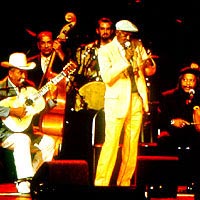|
TOTAL:
|
$0.00 |

|

|
|
Your On-Line Source for Latin Music Downloads!
|

|

Buena Vista
This artist has albums available.
Contact us to license Latin music.
|

| Album Name | Preview | Style | Price | |
|---|---|---|---|---|
| The Next Generation |
|
Son | $11.99 |

|

 Following in the steps of the Buena Vista Social Club mania that in 1997 launched a worldwide revival of traditional Cuban music by an all-star cast of veteran septuagenarian and octogenarian players, we have Buena Vista: The Next Generation. This new all-star cast of players is comprised mostly of the children and grandchildren of some of the greatest Cuban music legends, under the musical direction of trombonist Juan Pablo Torres. Adding a fresh breath of flavor and sound to the traditional sounds of Cuban music in this recording are Rubén González Jr. on piano (son of Ruben González), vocalist Manuel Licea (son of singer Puntillita), bassist Lazaro López "Cachao" (nephew of Cachaito), vocalist Maria Ochoa (sister of Eliades Ochoa), vocalist Miguelito Cuní Jr. (son of the famous singer of the same name), percussionist Johannes Bonat García (son of vocalist Teresita García), vocalist Conchita Torres (sister of Barbarito Torres), trumpeter Elpidio Chappottín (son of Félix Chappottín), and Alejandro, Ernesto and Leonardo Repilado (the grandsons of Francisco Repilado, alias Compay Segundo). Special guest musicians include Generoso Jiménez, Tata Güines, Changuito, Julio Padrón, Raúl Plana, Pio Leiva, Lazaro Reyes, and Pancho Amat. Highlights include the tracks Los Herederos (which features the veteran vocalists on the lead and their siblings on chorus), Pa' Los Rumberos (featuring Conchita Torres on vocals), and the Compay Segundo classic Chan Chan (in a version interpreted by the grandsons of the composer). The CD is packed with plenty of rumbas, sones and other traditional Cuban rhythms. --Rudy Mangual (Latin Beat Magazine)
Following in the steps of the Buena Vista Social Club mania that in 1997 launched a worldwide revival of traditional Cuban music by an all-star cast of veteran septuagenarian and octogenarian players, we have Buena Vista: The Next Generation. This new all-star cast of players is comprised mostly of the children and grandchildren of some of the greatest Cuban music legends, under the musical direction of trombonist Juan Pablo Torres. Adding a fresh breath of flavor and sound to the traditional sounds of Cuban music in this recording are Rubén González Jr. on piano (son of Ruben González), vocalist Manuel Licea (son of singer Puntillita), bassist Lazaro López "Cachao" (nephew of Cachaito), vocalist Maria Ochoa (sister of Eliades Ochoa), vocalist Miguelito Cuní Jr. (son of the famous singer of the same name), percussionist Johannes Bonat García (son of vocalist Teresita García), vocalist Conchita Torres (sister of Barbarito Torres), trumpeter Elpidio Chappottín (son of Félix Chappottín), and Alejandro, Ernesto and Leonardo Repilado (the grandsons of Francisco Repilado, alias Compay Segundo). Special guest musicians include Generoso Jiménez, Tata Güines, Changuito, Julio Padrón, Raúl Plana, Pio Leiva, Lazaro Reyes, and Pancho Amat. Highlights include the tracks Los Herederos (which features the veteran vocalists on the lead and their siblings on chorus), Pa' Los Rumberos (featuring Conchita Torres on vocals), and the Compay Segundo classic Chan Chan (in a version interpreted by the grandsons of the composer). The CD is packed with plenty of rumbas, sones and other traditional Cuban rhythms. --Rudy Mangual (Latin Beat Magazine)
In an interview with The New York Times, Ferrer proclaimed that "an angel came and picked me up and said, 'Chico, come and do this record.' I didn't want to do it, because I had given up on music. But now I have my own record, the first one ever, so I'm very happy. I don't have to shine shoes anymore."
The recording, named Buena Vista Social Club after the Havana institution, became an international success, and the ensemble was encouraged to perform with a full line-up in Amsterdam in 1998. German director Wim Wenders captured the performance on film, followed by a second concert in Carnegie Hall, New York City for a documentary that included interviews with the musicians conducted in Havana. Wenders's film, also called Buena Vista Social Club, was released to critical acclaim, receiving an Academy Award nomination for Best Documentary feature and winning numerous accolades including Best Documentary at the European Film Awards.
The success of both the album and film sparked a revival of international interest in traditional Cuban music and Latin American music in general. Some of the Cuban performers later released well-received solo albums and recorded collaborations with international stars from different musical genres. The "Buena Vista Social Club" name became an umbrella term to describe these performances and releases, and has been likened to a brand label that encapsulates Cuba's "musical golden age" between the 1930s and 1950s. The new success was fleeting for the most recognizable artists in the ensemble: Compay Segundo, Rubén González, and Ibrahim Ferrer, who died at the ages of ninety-five, eighty-four, and seventy-eight respectively; Segundo and González in 2003, then Ferrer in 2005.